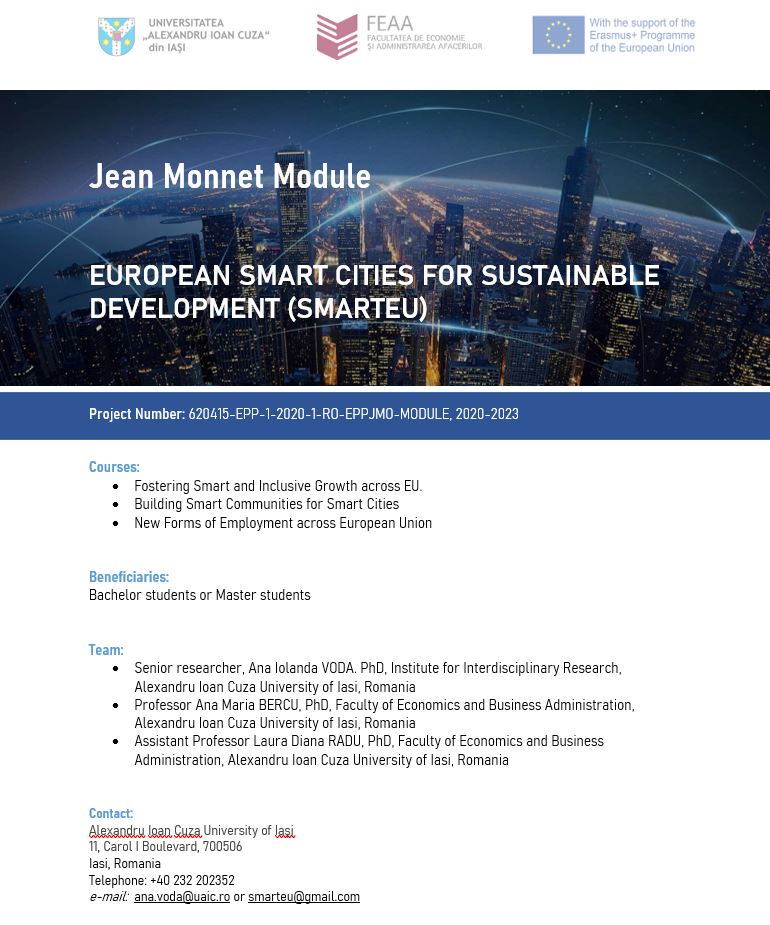Jean Monnet Project no. 620415-EPP-1-2020-1-RO-EPPJMO-MODULE, European Smart Cities for Sustainable Development (SmartEU) (2020-2023) is focused on the triple objective of the Europe 2020 strategy which emphasizes the importance of smart, sustainable, and inclusive cohesive growth and aims to enhance awareness on the EU smart cities development. Objectives The project aims to address the objectives and priorities of the Action, through the following specific objectives: - Deliver 3 new and interdisciplinary courses that will help students and young researchers to align their research to EU standards and priorities, offer the necessary knowledge to work and live in a smart city, and train them for a competitive and dynamic labor market
- Promoting excellence in teaching and research on EU smart cities, living and working in urban communities, and European Best Practice exchange
- Developing new borders of knowledge for students and young researchers in interdisciplinary fields and supporting adaptation to a hyper-connected and complex environment
- Encourage the exchange of ideas between students, teachers, policy-makers, business representatives, and the general public as a whole and strengthen the role of EU smart cities in a globalised world.
Activities The project will deliver three new and interdisciplinary courses; elaborate a portfolio of teaching materials; organise 3 workshops and an international conference; publish one conference volume and conduct innovative research activities. Beneficiaries: students and young researchers from different disciplines, enrolled at UAIC or others from the region, who are interested in understanding and enhancing awareness of the EU smart cities development. Latest news on the project activities New! International Conference: SMARTEU2023 We are glad to invite you to submit your papers and to participate in the International Conference "Sustainable Development of European Smart Cities", on 9th – 10th of JUNE 2023, IASI, ROMANIA. The International Conference "Sustainable Development of European Smart Cities" 2023 is an initiative dedicated to open, inclusive, formal, and informal dialogue on topics related to the Smart Cities concept from different perspectives with members of academia, young researchers, professionals, and city representatives, among others. The conference is intended to be one major outcome of the Jean Monnet Project no. 620415-EPP-1-2020-1-RO-EPPJMO-MODULE, European Smart Cities for Sustainable Development (SmartEU), within the Erasmus+ Programme of the European Union.
New!!! CONFERENCE PROCEEDINGS IS NOW AVAILABLE HERE:  Smart EU volume_Conference Proceedings_2023.pdf Smart EU volume_Conference Proceedings_2023.pdf
Book of abstracts - SMARTEU 2023  SMART EU_volum abstracte_2023.pdf SMART EU_volum abstracte_2023.pdf
Publication opportunities- SPECIAL ISSUE
Summer School Enrolment 2023 has now closed. Registration to JM Summer School courses-Academic year 2022-2023 - Students' registration to the SmartEU, academic year 2022-2023, is NOW closed. Participation is open to students and young researchers from different disciplines, enrolled at UAIC or other universities from the region. See the description of the courses.
- The schedule will be sent to the enrolled students. The meetings will be in a hybrid format.
Documents for registration: - Identity card - copy; 2
- CV - europass format (.doc; .docx; .pdf);
- Student certificate (only for people from outside UAIC);
- Completion of the registration form
Registration can be: - On-site (B526, FEAA, UAIC)
- Online Registration !! Please have the above-mentioned documents ready and fill out the registration form (CLICK ON REGISTER NOW BUTTON)
To prevent spamming, we kindly ask you to log in: - If you are a FEAA student, please use your Teams credentials.
- If you are not a FEAA student, please login using the following credentials:
- User name: smarteu.guest@feaa.uaic.ro
- Password: Smarteu2021
Frequently Asked Questions (FAQs section) and Questions & answers (Q&A section)
Q1. What is the selection process for the Summer School enrolment?
1. Selection process for the Summer School students: "first come, first served"
Q2. Do we have a detailed description of the courses?
2. The course structure is available on the project website: section COURSES. See the description of the courses.
Q3. How many students can participate in the Summer School?
3. The total number of participants is 45.
| 
|
